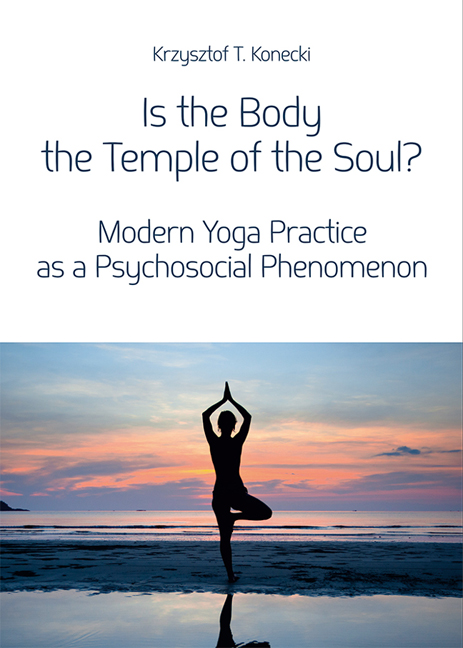Book contents
- Frontmatter
- Contents
- Foreword (Michał Szczepanik)
- Introduction
- Chapter 1 Philosophy and hatha-yoga practice. Para-religious aspects of hatha-yoga
- Chapter 2 The social world of yoga practice
- Chapter 3 Commonsense definitions of yoga and its meaning for practitioners
- Chapter 4 The process of becoming a hatha-yoga practitioner
- Chapter 5 Visual transmission of knowledge and the meaning of corporality and gestures in the social world of yoga practice
- Chapter 6 Emotions and yoga practicing. Working on emotions and achieving “emotional culture” without emotions
- Chapter 7 Teacher and guru in hatha-yoga practice
- Conclusions
- Bibliography
Introduction
Published online by Cambridge University Press: 10 January 2018
- Frontmatter
- Contents
- Foreword (Michał Szczepanik)
- Introduction
- Chapter 1 Philosophy and hatha-yoga practice. Para-religious aspects of hatha-yoga
- Chapter 2 The social world of yoga practice
- Chapter 3 Commonsense definitions of yoga and its meaning for practitioners
- Chapter 4 The process of becoming a hatha-yoga practitioner
- Chapter 5 Visual transmission of knowledge and the meaning of corporality and gestures in the social world of yoga practice
- Chapter 6 Emotions and yoga practicing. Working on emotions and achieving “emotional culture” without emotions
- Chapter 7 Teacher and guru in hatha-yoga practice
- Conclusions
- Bibliography
Summary
In modern Eastern societies, we are looking for something that would take us away from everyday life, from the workload and the problems connected with work, or the lack thereof. Everyday life is what aches us the most, but we have to go through it to achieve maturity and ask ourselves serious questions. This maturity is often connected with the will to understand oneself, the mind, and the body. The inherent limitations of these aspects are strongly visible when we cannot manage with the race of our thoughts connected with a purposeful, rational usage of time, which the harder we try to achieve, the more control we lose. Our mind often does not cope with the everyday routine that thickens more and more around us, where in our perception time often loses its linear character, being just a way to get us to a moment, in the form of meetings and making further plans and arrangements. Hence step by step we become weaker, both mentally and physically.
Feeling this, we often end up asking ourselves the question: “How can we stop this course?” Others may ask: “How can we improve the shape of their bodies and minds in order to manage with the slowly-consuming everyday life?” These two adult questions (“adult” not being connected here with biological age, but with one's state of mind) create a motivational base for the search to find a permanent and stable drift in everyday life, or to strengthen one's psycho-physical state in order to manage life. Thus begins an individual search. Some turn towards actions connected with other people and in this way realize that time is a relative notion, especially when we want to help others. We find time for them. Others find themselves in different types of hobbies, while some run away from everyday life by the simple act of travelling, and thus find themselves in the claws of the tourist agency world. Sport and physical activity also offer a possibility to improve one's psycho-physical state, as well as to escape from everyday life. Training and/or participation in marathons enables individuals to partially run away from everyday life, but still be strongly submerged, and boosting self-esteem is evident in a variety of different, everyday life aims, often not connected with sport. The ego is also working hard in sport.
- Type
- Chapter
- Information
- Is the Body the Temple of the Soul?Modern Yoga Practice as a Psychosocial Phenomenon, pp. 9 - 20Publisher: Jagiellonian University PressPrint publication year: 2016



